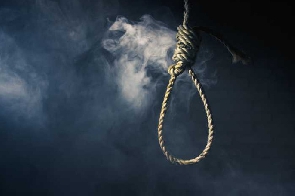The Australian High Commissioner to Ghana has called on government to reconsider the recommendations made by the Constitutional Review Committee in 2010 to abolish the death penalty.
Andrew Barnes said death penalty was irrevocable and if the convict was later found innocent, it would be a miscarriage of justice that cannot be rectified.
Mr Barnes was speaking at a stakeholder engagement on the abolition of death penalty in Ghana to mark the World Day Against Death Penalty.
It was jointly organised by the Australian High Commission, French Embassy and the Amnesty International Ghana.
This year’s theme was “Children: unseen victims of the death penalty”.
Stakeholders including; representatives from security agencies, lawyers, government officials, Attorney General, Dr Isaac Annan, Director of Human Rights-CHRAJ, and Dr Evans Aggrey-Darkoh, Chief Director for Parliamentary Affairs.
He said since no legal system is free of error and as it had not been served as a deterrent, Australia abolished it in 1985 with the last execution being 1967, adding that in 2010, the Federal Government passed a legislation prohibiting the re-establishment of capital punishment by the Australian State or territory.
Since that time, he said it advocated its abolition across the world and as a member of the UN Human Rights Council for the 2018-20 term, Australians continued to support the course based on the fact that it removed possibilities of rehabilitation for the convict, brutalised society, degraded the citizenry and against human dignity.
The High Commissioner said though violent criminals needed to be punished, his country did not support capital punishment as it was not effective deterrent than long term or life imprisonment.
Above all, Australia considered it as unfair as it could be used against the vulnerable, the poor, as a political tool, minority groups and people with mental disabilities.
It has therefore called on government, among other countries to remove it from the constitution whether it carried out executions or not, stop its imposition on juveniles, pregnant women, mentally derailed and sign the second optional protocol to ICCPR, aimed at the abolition of death penalty.
Samuel Agbotsey, Campaigns Coordinator, Amnesty International, Ghana said death sentence offered illusion of closure and vindication, but no act could bring back a loved one.
He said it rather had negative impacts on society, especially children of those executed or on death penalty such as stigma, which may be compounded by multiple forms of discrimination.
Such children are traumatised and lose self-esteem, experience stress, anxiety, lose concentration in school or drop-out and left out per the motto of the SDGs
Mr Agbotsey said their rights to freedom from violence, special protection and assistance when state action caused a child to be deprived of his or her family environment and rights to adequate standard of living was not fulfilled.
He cited that as of December 31, 2018, the Amnesty International Global Report statistics had 172 people sentenced to the death penalty.
Anne Sophie Ave the French Ambassador to Ghana sharing how France abolished it 38 years ago, said Ghana would also get with daring spirit, perseverance and courage.
Martin Kpebu, a lawyer suggested that death penalty should be replaced by life imprisonment.
He said, for now, Section 46 of Act 26 (Act of Parliament) should be amended not Article 13 because that is part of the fundamental human rights and it is entrenched which would require a referendum.
Participants called for extensive awareness, education, advocacy, social mobilisation, among others to drum home the topic before it would be abolished so that it would be owned by the citizenry.
They said in as much as children of convicts were considered, those of the murdered should not be left out.
General News of Wednesday, 16 October 2019
Source: ghananewsagency.org













